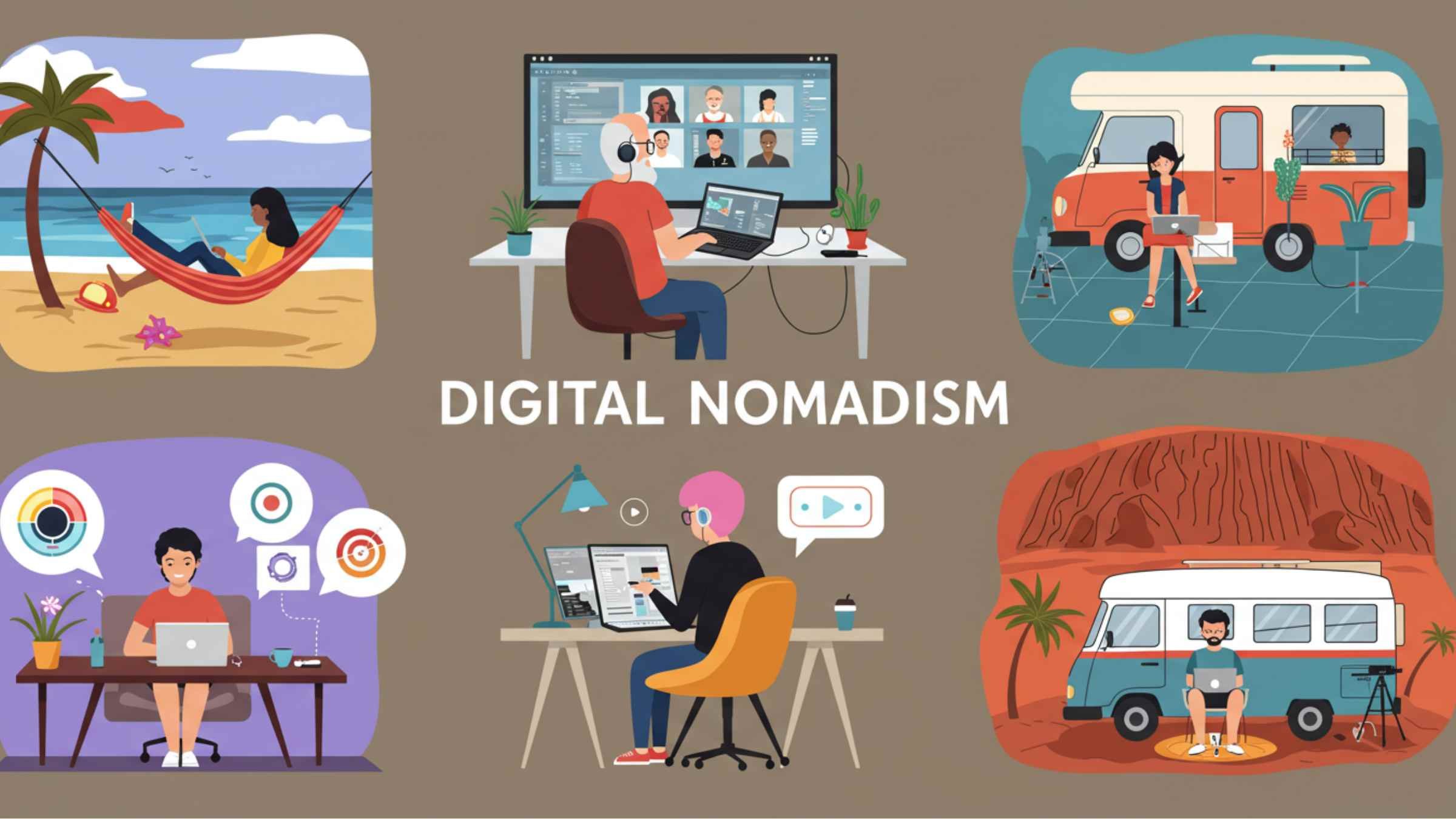The Digital Nomad Guide: Thriving While Working from Anywhere
The rise of remote work and online entrepreneurship has given birth to a new breed of professionals: digital nomads. These individuals work from anywhere in the world, from beachside cafés in Bali to bustling coworking spaces in Lisbon. For many, this lifestyle is no longer just a dream but a viable and sustainable way of working. The freedom to choose where to live and work comes with incredible benefits, but it also presents unique challenges that require careful planning and adaptability.
In this article, we’ll explore what it means to be a digital nomad, how to get started, the best destinations for remote work, and essential tips for staying productive and maintaining work-life balance. Whether you’re considering taking the leap into this lifestyle or are already on the road, this article will help you navigate the exciting world of digital nomadism.

What Is a Digital Nomad?
A digital nomad is someone who earns a living through remote work while traveling to different locations. Unlike traditional employees who are tied to an office, digital nomads have the flexibility to work from anywhere with a stable internet connection. This lifestyle is made possible by advancements in communication and collaboration tools, online payment systems, and remote job opportunities.
Many digital nomads work as freelancers, remote employees, entrepreneurs, or content creators. Popular career paths include web development, graphic design, marketing, writing, consulting, and e-commerce. With the rise of digital nomad visas and companies embracing remote work, this way of living has become more accessible than ever before.

The Rise of the Digital Nomad Lifestyle
Over the past decade, the number of digital nomads has increased significantly, largely due to the expansion of remote work opportunities and improved internet connectivity worldwide. The COVID-19 pandemic accelerated this trend, as businesses realized that employees could remain productive without being physically present in an office. According to a report by MBO Partners, the number of digital nomads in the U.S. alone exceeded 10 million in 2020, and this number continues to grow globally. (Source)
Countries around the world have also started recognizing the potential economic benefits of digital nomads. Many have introduced special visas that allow remote workers to live and work legally for extended periods. Destinations like Portugal, Mexico, Bali, and Georgia have become hotspots for location-independent professionals, offering affordable living costs, excellent coworking spaces, and thriving expat communities.

Benefits of Being a Digital Nomad
One of the biggest advantages of the digital nomad lifestyle is the freedom to choose where and how you work. You’re not restricted to a single city or country, allowing you to experience different cultures, cuisines, and ways of life. Many nomads strategically base themselves in locations with a lower cost of living, maximizing their income while enjoying a high quality of life.

Another key benefit is work-life balance. While traditional office jobs often come with rigid schedules, digital nomads can structure their days to align with their most productive hours. Whether it’s working in the morning and exploring in the afternoon or taking mid-week breaks to avoid weekend crowds, this lifestyle allows for a more flexible and fulfilling routine.
Beyond professional freedom, digital nomadism also promotes personal growth and adaptability. Constantly navigating new environments, meeting people from different backgrounds, and overcoming challenges on the road builds resilience, problem-solving skills, and a global perspective that few other lifestyles can offer.
Challenges of the Digital Nomad Lifestyle
While the digital nomad lifestyle offers numerous advantages, it also comes with significant challenges:
- Unstable Income – Freelancers and entrepreneurs often face inconsistent earnings, making financial planning crucial.
- Time Zone Differences – Coordinating with clients or teams across different time zones can lead to irregular work hours.
- Loneliness & Isolation – Constant travel can make it difficult to build deep, lasting relationships.
- Work Distractions – New environments and frequent travel can sometimes make it hard to stay focused.
- Visa & Tax Complications – Navigating legal requirements for long-term stays in different countries can be complex.
Successful digital nomads develop strategies to mitigate these challenges, such as setting up passive income streams, maintaining a structured routine, and joining coworking spaces or online communities to stay socially and professionally engaged.

How to Get Started as a Digital Nomad
Choose a Remote-Friendly Career
If you want to become a digital nomad, the first step is ensuring you have a source of income that supports location independence. Common remote-friendly careers include:
- Freelancing – Writers, designers, developers, and marketers can find gigs on platforms like Upwork, Fiverr, and Toptal.
- Remote Jobs – Many companies offer full-time remote positions on job boards like We Work Remotely, Remote.co, and FlexJobs.
- Entrepreneurship – Some nomads start online businesses, such as dropshipping, consulting, or affiliate marketing.
Set Up a Reliable Work Environment
Your ability to work efficiently depends on having the right tools. A good laptop, portable Wi-Fi hotspot, and noise-canceling headphones can significantly improve your work experience. Many nomads also rely on cloud storage (Google Drive, Dropbox) and project management tools like Trello, Asana, and Slack to stay organized.
In addition to the tools and resources for digital nomads, platforms like Kafkai, which leverages AI for content generation, can be a helpful tool for those managing blogs, websites, or online businesses while on the go. It is worth it to try Kafkai.

Plan Your Finances
Before setting off, it’s important to have a financial safety net. Most experts recommend saving at least 3-6 months’ worth of living expenses. Banking and international money transfers can also be tricky while on the road, so consider using services like Wise or Revolut for easy currency exchange. You should do a research on tax laws in your home country and any legal requirements for staying abroad long-term.
Final Thoughts: Is the Digital Nomad Lifestyle Right for You?
If you’re considering this lifestyle, start by testing remote work in different locations before committing long-term. Research visa options, join online communities, and develop a strong work routine that balances productivity with personal fulfillment. With the right preparation and mindset, the world becomes your office, and every day is an opportunity for new experiences.
Are you ready to take the leap into digital nomadism? The journey starts now!
Do you have a story to share with us, please do contact me.
